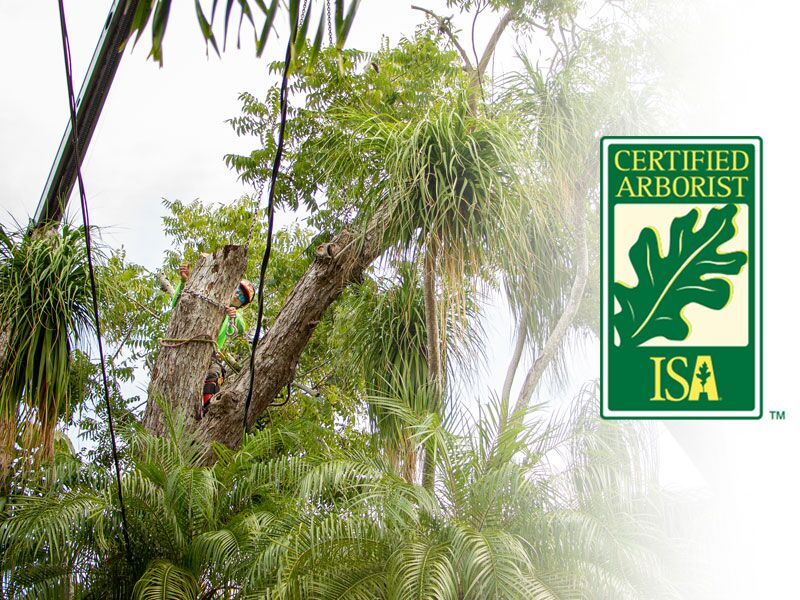What Does It Mean to Be an ISA-Certified Arborist?
Navigating the world of tree care can be daunting, especially when you encounter terms like “ISA-certified arborist.” If you’ve ever wondered what this certification entails or why it matters, you’re in the right place.
Read on to learn about ISA certification and the benefits of entrusting your tree care to ISA-certified experts.
History of ISA
Let’s take a quick look at the history of the International Society of Arboriculture. Its origins can be traced back to the 1920-s when the Shade Tree Conference (STC) was launched to address the problems of poor regulations and a lack of uniformity in the tree care industry.
The National Shade Tree Conference became important due to the Great Depression years, resulting in many small tree care companies forming due to massive layoffs. The line-clearing segment of agriculture took center stage when the industry needed uniform guidance due to the start of World War I.
Over the years, the NSTC has been expanding through new memberships and chapter developments. The first International Shade Tree Conference (ISTC) took place in 1961, and the International Society of Arboriculture was established on January 1, 1976, in response to the organization’s expansion.
By that time, a tax-exempt Memorial Research Trust Fund was established to fund research in areas of tree management and maintenance. This includes planting, plant health, tree failure, soils, and environmental benefits of trees.
ISA Certification
The Arborist Certification Program was launched in 1992 on an international scale. The primary objective behind the inception of the ISA Arborist Certification Program was to establish a benchmark for professionalism in arboriculture. It aimed to educate individuals involved in tree care services, testing and certifying their knowledge in various aspects of arboriculture.
Areas of Expertise
A panel of industry experts develops the ISA certification examination. Derived from a comprehensive job task analysis survey filled out by arborists worldwide, the exam assesses proficiency across ten key areas of knowledge:
Tree Biology (11%): Understanding the biological processes that govern tree growth and development is fundamental for any arborist. From photosynthesis to cellular structure, knowledge of tree biology enables them to make informed decisions regarding tree care practices.
Tree Identification and Selection (9%): The ability to identify various tree species and select the appropriate species for a given climate is important to arborists when performing maintenance tasks or choosing trees for planting.
Soil Management (7%): Healthy soil is essential for the well-being of trees. Tree surgeons must possess knowledge of soil composition, structure, and management techniques to ensure optimal conditions for tree growth and vitality.
Installation and Establishment (9%): Proper planting techniques are vital for the growth of trees. The certification ensures that arborists are proficient in planting methods, root management, and growth care to promote healthy root development and minimize transplant shock.
Pruning (14%): Pruning is a fundamental aspect of tree maintenance, influencing tree structure, health, and aesthetics. Tree surgeons skilled in various pruning techniques understand how and when to prune to achieve specific objectives while minimizing injury risks or tree damage.
Diagnosis and Treatment (9%): Identifying tree diseases, pests, and other health issues requires a keen eye and diagnostic skills. Arborists must be able to assess symptoms, conduct diagnostic tests, and recommend appropriate treatment strategies to mitigate or prevent tree health problems.
Trees and Construction (9%): Trees and construction often intersect, presenting challenges such as root damage, soil compaction, and structural conflicts. Tree surgeons who understand the interactions between trees and construction activities can implement measures to protect trees and minimize adverse impacts.
Tree Risk (11%): Assessing and mitigating tree risk is essential for public safety and property protection. It’s necessary for arborists to identify potential hazards, evaluate risk factors, and implement risk management strategies to reduce the likelihood of tree-related incidents.
Safe Work Practices (15%): Safety is paramount in arboriculture, where working at heights and with heavy machinery poses inherent risks. Arborists must adhere to safety protocols, use proper equipment, and prioritize safety measures to prevent accidents and injuries.
Urban Forestry (6%): In urban environments, trees play a vital role in enhancing the quality of life for residents. Tree surgeons must understand the unique challenges of urban forestry, including those associated with tree planting, maintenance, and management.
Importance of ISA Certification
So, why is it important to hire an ISA-certified arborist in Fort Myers, Florida?
Expertise
The organization sets rigorous standards for arborists seeking certification. One of the primary requirements is a minimum of three years of full-time experience in arboriculture or a combination of education and practical experience. This ensures they have a solid foundation of hands-on knowledge before they even begin the certification process.
Commitment to Continuous Learning
Certified arborists must also demonstrate a commitment to ongoing education and professional development. The ISA Certification expires after three years. Tree surgeons should either retake the exam or accumulate at least 30 continuing education units (CEUs) over the three-year certification period. This ensures they remain at the forefront of arboricultural knowledge, delivering superior tree care services to their clients.
Protection and Professionalism
In addition to expertise, ISA-certified arborists also uphold high standards of professionalism and accountability. They must maintain liability insurance and workers’ compensation coverage, safeguarding both themselves and their clients in the event of any unforeseen accidents or damages.
Certified arborists adhere to the ISA Code of Ethics, which outlines their commitment to delivering top-quality tree care, prioritizing safety, and providing exceptional customer service. When you hire one, you can rest assured that they operate with integrity and accountability at every step of the process.
Spring and summer in Fort Myers, Florida, are the seasons when tree care services are in high demand. Make sure that you choose an ISA-certified contractor, such as Joshua Tree Inc. We are proud to provide top-notch tree care services across all of Southwest Florida. Contact us today for a free estimate!

